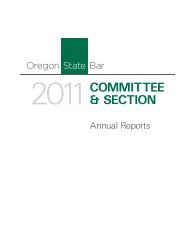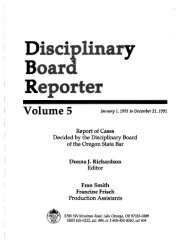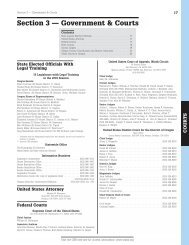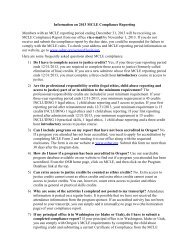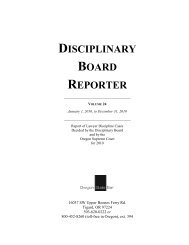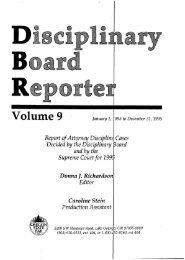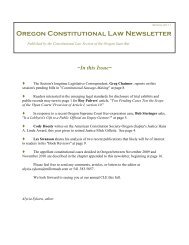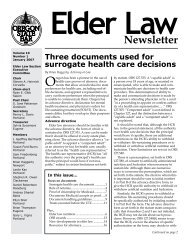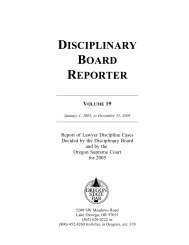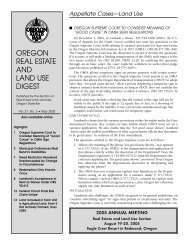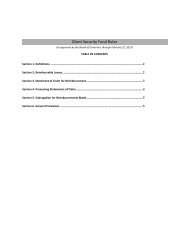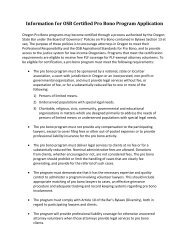February 22, 2013 - Oregon State Bar
February 22, 2013 - Oregon State Bar
February 22, 2013 - Oregon State Bar
You also want an ePaper? Increase the reach of your titles
YUMPU automatically turns print PDFs into web optimized ePapers that Google loves.
2 OSB Client Security Fund Rules (Revised 02/10)<br />
Formatted: Font: (Default) Calibri<br />
Section 1. Definitions.<br />
For the purpose of these Rules of Procedure, the following definitions shall apply:<br />
1.1 “Administrator” means the person designated by the OSB Executive Director to oversee the operations of<br />
the Client Security Fund.<br />
1.2 “<strong>Bar</strong>” means the <strong>Oregon</strong> <strong>State</strong> <strong>Bar</strong>.<br />
1. 3 “Committee” means the Client Security Fund Committee.<br />
1.2 4 “Fund” means the Client Security Fund.<br />
1.3 5 “Lawyer” means one who, at the time of the act or acts complained of, was an active member of the<br />
<strong>Oregon</strong> <strong>State</strong> <strong>Bar</strong> and maintained an office for the practice of law in <strong>Oregon</strong>.<br />
1.4 6 “Client” means the individual, partnership, corporation, or other entity who, at the time of the act or acts<br />
complained of, had an established attorney-client relationship with the lawyer.<br />
1.5 7 “Claimant” means one who files a claim with the Fund.<br />
1.6 8 “Dishonest conduct” means a lawyer’s willful act against a client’s interest by defalcation, by<br />
embezzlement, or by other wrongful taking.<br />
Section 2. Reimbursable Losses.<br />
A loss of money or other property of a lawyer’s client is eligible for reimbursement if:<br />
2.1 The claim is made by the injured client or the client’s conservator, personal representative, guardian ad<br />
litem, trustee, or attorney in fact.<br />
2.2 The loss was caused by the lawyer’s dishonest conduct.<br />
2.2.1 In a loss resulting from a lawyer’s refusal or failure to refund an unearned legal fee, “dishonest<br />
conduct” shall include (i) a lawyer’s misrepresentation or false promise to provide legal services to a client<br />
in exchange for the advance payment of a legal fee or (ii) a lawyer’s wrongful failure to maintain the<br />
advance payment in a lawyer trust account until earned.<br />
2.2.2 A lawyer’s failure to perform or complete a legal engagement shall not constitute, in itself, evidence<br />
of misrepresentation, false promise or dishonest conduct.<br />
2.2.3 Reimbursement of a legal fee will be allowed only if (i) the lawyer provided no legal services to the<br />
client in the engagement; or (ii) the legal services that the lawyer actually provided were, in the<br />
Committee’s judgment, minimal or insignificant; or (iii) the claim is supported by a determination of a<br />
court, a fee arbitration panel, or an accounting acceptable to the Committee that establishes that the<br />
client is owed a refund of a legal fee. No award reimbursing a legal fee shall exceed the actual fee that the<br />
client paid the attorney.<br />
2.2.4 In the event that a client is provided equivalent legal services by another lawyer without cost to the<br />
client, the legal fee paid to the predecessor lawyer will not be eligible for reimbursement, except in<br />
extraordinary circumstances.<br />
2.3 The loss was not covered by any similar fund in another state or jurisdiction, or by a bond, surety<br />
agreement or insurance contract, including losses to which any bonding agent, surety or insurer is subrogated.<br />
2.4 The loss was not to a financial institution covered by a “banker’s blanket bond” or similar insurance or<br />
surety contract.<br />
2.5 The loss arose from, and was because of:<br />
2.5.1 an established lawyer-client relationship; or<br />
Current versions of this document are maintained on the OSB website: www.osbar.org



